If the past two years have made anything clear, it’s that Black Americans still face inequities, barriers and brutalities in this country on the daily. But these years have also shown that Black history in this country is rich and complex, full of highs and lows and worth honoring — knowledge that all of us, regardless of race, must come to recognize if we truly want to practice anti-racism.
We need Black History Month more than ever. But it’s important to recognize the contributions and legacies of Black Americans — and their current successes and future goals — on a regular basis, rather than just in the month of February.
In honor of this month and the year-round contributions of Black employees, we asked Black community members across UW Medicine what Black history and culture mean to them and how non-Black people in our organization can be better allies.
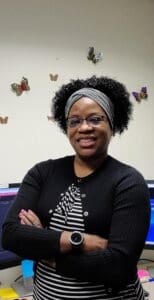
LaToyce Lindsey
LaToyce Lindsey, Manager of Operations, Department of Laboratory Medicine & Pathology, Harborview Medical Center
What does your Black/African American heritage mean to you?
As a Black American my heritage means a lot to me. Our culture and inherited traditions are valuable. We have certain traditions that have been passed down from generation to generation. I am who I am because of my heritage.
What are your favorite parts of Black culture or favorite Black cultural traditions?
What I love most of my cultural traditions are family, religion, cooking and education. These four things keep our families whole. I would love to get back to having family time. Spending our Sundays worshiping to feed our souls and then after spending time breaking bread together to feed our bodies. Family means the world to me. Even though distance divides us, when we come together it’s like we never departed. I was taught that education is very important because our culture was once deprived of education as an educated slave was considered a threat. So, therefore, my mind is like a sponge, and it never stops absorbing.
Is there something you wish people knew more about your culture or racial identity?
It’s amazing that after all that our ancestors sustained during slavery, they still taught us to hold our heads high and to love one another as God loves us.
What can we do to honor Black people and Black cultures at UW Medicine?
Keep in mind that Black History Month is every month for Black families, because Black History is American History.
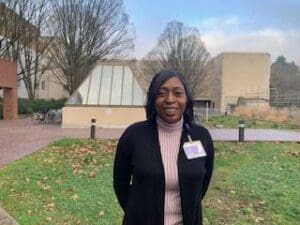
Julie Reed
Julie Reed, Operations Manager, Admitting & Emergency Department Registration, Patient Access
What does your Black/African American heritage mean to you?
Remembrance, never forgetting our history, the past, which makes us who we are today. The struggle for freedom and equality, the strength to endure. Perseverance in the face of racism and injustice.
What are your favorite parts of Black culture or favorite Black cultural traditions?
My favorite part of Black culture is our love of family, church and festivity. Celebrations, sharing food, exchanging recipes. The bright vibrant colors, musicality, rhythm and dance that accompany the joy of gathering with family and friends in celebration.
Is there something you wish people knew more about your culture or racial identity?
I want people to know that Black people are hardworking, intelligent, family oriented, proud people, and have shown resilience in the face of adversity. Homage to those before us, those that paved the way, advocated for change and were able to transform people, redirect the course of our nation. We continue the fight against injustice and racism in its many forms; we matter.
What can we do to honor Black people and Black cultures at UW Medicine?
Representation and action matter. Take substantial steps advocating for Black voices. Outreach, access and equitable healthcare services to marginalized communities and Black people. Ensure transparency and authenticity from the very top of our organization down to the roots.
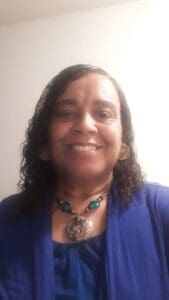
Deborah Bell
Deborah Bell, Manager of Program Operation, Department of Laboratory Medicine and Pathology
What does your Black/African American heritage mean to you?
Black/African American heritage means a lot to me. My heritage is what makes me who I’m today. A strong, beautiful, confident, professional, kind and compassionate Black woman. If it wasn’t for the strong women that came before me and paved a better path for me to follow, I don’t know where I would be today.
What are your favorite parts of Black culture or favorite Black cultural traditions?
My favorite part of my culture is the resilience, strength and compassion for others that was instilled in us as children. Culture traditions, getting together with family and close friends to just sit around and enjoy each other’s company. I love to hear the laughter at annual family reunions. Attending church with the family. Good eating and cooking. Keeping up with the latest new dance moves (so much fun). Coming together not only for the good times but also to help lift each other up during the hard times. Family, education and faith has always been a very important part of our family traditions even till this day. Golden rules: Love, faith, education, compassion, respect toward others, self-love and endurance.
Is there something you wish people knew more about your culture or racial identity?
I/we are no different than any other race. We laugh, we cry, we hurt, we love, we have feelings, we are a diverse group of people, we are not all the same. We are like everyone else. We are unique, smart and special in our own way.
What can we do to honor Black people and Black cultures at UW Medicine?
Remember we are Black year-round not just one month out of the year. We are Americans. We all have a history and a story to tell. Respect each other’s differences and uniqueness. We all want to enjoy our life’s journey in our own way without being judged or misunderstood.

Walter E. McKenzie
Walter E. McKenzie, LICSW, Social Worker/Medical Case Manager
What does your Black/African American heritage mean to you?
For myself there has always been a tension, conflict or a sense of mixed emotions I feel about being Black in America, particularly as a Black man. We live in a country that hasn’t always treated us well. A world that loves our music, sports acumen, copies our hair and latest dance moves but isn’t always willing to recognize our humanity, individuality or even our right to be here.
Consider for a moment the recent uproar regarding the 1619 Project. We, our nation, aren’t able to collectively agree on basic truths about our well documented history on this land. People who are willing to discount the multigenerational traumas of slavery and Jim Crow. But I know I come from a heritage of hard working, resilient people still striving for a country that will fulfill all of its promises.
What are your favorite parts of Black culture or favorite Black cultural traditions?
I love all the parts of Black American culture, in particular Black Southern culture. But if I had to choose it would probably be our culinary traditions rooted in the African diaspora. It’s true of so many cultures but food is love, it is community and it is togetherness. I like to remind folks how black-eyed peas, okra and even rice arrived in the Americas through Africa.
I hope I’m not sharing a secret, but I also love the cultural tradition of what Black folks call “speaking.” It is the notion of acknowledging the presence of other Black folks in a space even if we don’t know each other. I often walk down the street and Black people I have never met will offer a greeting or even just a nod of the head. There is this culture of connection, solidarity, a moment of togetherness in the struggle. It is tradition, many of us do it, we were just raised that way.
Is there something you wish people knew more about your culture or racial identity?
Black people are not a monolith. We are not all the same, though many of us have much in common. We are individual, sentient beings who have different opinions, different faiths, different politics, that only ask for the same inclusion and respect afforded others.
I would also add Black people are not an “other.” Being born Black in the USA is as American as apple pie. I have a father, brothers, my brother’s wife and cousins who all served in the military. A brother who is a retired police officer. My mother and father were public school educators and believed in service. Here I am at Harborview giving back to the community in my own way. Though our ancestors came from different nations on the African continent, we are now very much rooted in the soil of this country.
What can we do to honor Black people and Black cultures at UW Medicine?
Striving to make UW Medicine a safe space for patients and staff who come from Black communities. At a minimum we have to make sure we don’t contribute to health disparities and by offering care and work environments that make Black folks feel welcome, included and cared for so they keep coming back.
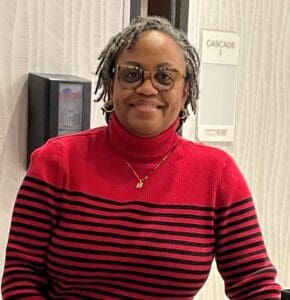
Cydney Barnes
Cydney Barnes, BSHS, Business Operations Supervisor, Neurosciences Institute, Spine Center, and Sports Medicine & Stroke Clinic at Harborview
What does your Black/African American heritage mean to you?
Strong, Strengthen, Courage, Proud, Resilience.
What are your favorite parts of Black culture or favorite Black cultural traditions?
Family, Church, Food and Music. Honoring our Ancestors.
Is there something you wish people knew more about your culture or racial identity?
I would like the decedents of those who colonized this country and who benefited financially from slavery to see if you/they can ever feel the pain of the race of the Black/African people. Can you wrap your mind around the price tag of your privileges? Understand the cost of what we are still paying for your current privileges.
What can we do to honor Black people and Black cultures at UW Medicine?
Hire more Black people. See more Black people in higher education. Create Black scholarships for Black youth to get into college.
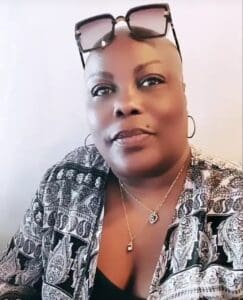
Sharon Reed
Sharon Reed, MSN, RN, BSN, AAACN, African American Hypertension Educator, Adult Medicine Clinic at Harborview
What does your Black/African American heritage mean to you?
My African American heritage means a legacy of cultural strength, resilience and self-determination from my ancestors to defy the odds and continuous improvement of our legacy. The ambition to reflect on past historical struggles as a reminder to continue to advocate for equity and inclusion.
What are your favorite parts of Black culture or favorite Black cultural traditions?
I appreciate my Black culture for being amazing historical entrepreneurs, being spiritual/religious and having faith. We are varied individuals, who come in all shapes, sizes and color and we are beautiful human beings. I am proud of the strength and pride that my culture has shown throughout slavery and currently with the continued killing of our youth. We continue to stand strong, not broken but we are human and our heart hurts for the humility of oppression that we continue to endure.
My favorite cultural traditions are family BBQ/gatherings. This is a time for family to enjoy one another with laughter, eating our cultural foods and reminisce of the time we share with one another. There is nothing better than “grandma’s” food and passing down the traditional recipes and showing the younger generation family traditions and we can’t forget the famous “electric slide/soul train line dances.”
Is there something you wish people knew more about your culture or racial identity?
I am a proud African American woman who has beat the statistics of being a single mother of two, who has achieved higher education by obtaining a master’s degree in nursing education and has raised two amazing African American women who are also college educated. I wish there was more awareness of the social determinants that affect African Americans among the implicit bias that still exist within our systems/organizations.
I wish people knew and understood more about African history, of the famous inventors, activists, educators and philanthropists within our culture (e.g., Dr. Dale Williams: first successful heart surgery; Madam C. Walker: advancement of Black Americans and for an end to lynching; Mary Mahoney: first African American licensed nurse; Granville Woods: induction to the telegraph system and first electricity powered railway). There are so many that we are not educated on in African history to know about within our school systems or spoken upon. Let’s continue to remember and gain a clear understanding in which Martin Luther King, Jr. spoke of, “I Have a Dream,” a speech delivered at the March on Washington on August 28, 1963.
What can we do to honor Black people and Black cultures at UW Medicine?
Recognize and understand that there is not equity or diversity within our systems, bring awareness for creating tools in which to accelerate leadership positions. Have more peers that are relatable and look like us. Have no tolerance for microaggressions, which are actually macroaggressions that tend to be ignored or viewed as unintentional. Recognize that these behaviors would not be tolerated if diverted toward any other culture without some type of consequence. Lastly, UW could recognize the many African American staff that they have within their organization that are doing amazing things who have continued to be dedicated with all the barriers they face within our society, which include racism and discrimination. UW can be an organization which is known for improving diversity, equity and leadership positions within their system, which means being innovative for our future and dismissing those who are still living in the past of racial depression.
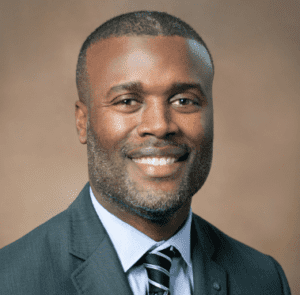
James Jones
James Jones, UW Medicine Chief Nursing Informatics Officer
What does your Black/African American heritage mean to you?
It is a reminder that people who look like me have significantly impacted the world. It encourages me to be resilient and make my mark in the healthcare industry where I am underrepresented. I believe it is the responsibility of every generation to add their own contributions toward the advancement of Black people within our society. Black heritage is a time for remembering, rejoicing, celebrating and thanking Black people for giving us both life lessons and hope that can be used by others to propel a better future for all.
What are your favorite parts of Black culture or favorite Black cultural traditions?
Our culture continues to thrive on creativity and innovation and Black innovators continue to master transforming creative ideas into viable business brands and industry best practices. Our creative ideas have shaped and shifted American culture and continue to be economic staples in America.
Is there something you wish people knew more about your culture or racial identity?
We cannot examine the Black freedom struggle or the Civil Rights movement without recognizing the white allies who worked in concert with Black people. One of the main issues we see, especially for those non-Black people, is the emphasis on Black History being divisive. We must continue to highlight that many Americans worked toward these common goals, then everyone can see themselves as part of the larger mission.
What can we do to honor Black people and Black cultures at UW Medicine?
Religious and cultural beliefs in Black/African American culture are important to understand when it comes to healthcare. We must be attentive to and continue to address the healthcare disparities amongst Black people such as limited access to healthcare, the underutilization of healthcare services, quality of care received, and having inadequate health insurance coverage. If we can all work together to incrementally improve these areas, we can eventually become a healthier society as a whole.
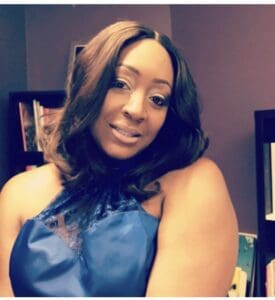
Tracy Ezell-Greenlee
Tracy Ezell-Greenlee, Patient Care Coordinator, Stroke Clinic
What does your Black/African American heritage mean to you?
It means so much to me, it is a representative of our struggles, our resilience and our triumphs. It means unity and our continued effort to do better and be better. It also represents my connection to be a part of my identity and also emphasizes the responsibility I have to both myself/my family and my community to continue to strive for greatness even when we are treated unfair.
What are your favorite parts of Black culture or favorite Black cultural traditions?
I love being a strong Black woman of color, Black history month, Juneteenth, MLK’s bday.
Is there something you wish people knew more about your culture or racial identity?
We must begin with self-work around our own racial identity and how it relates to our country and system as a whole. We are also humans that have been through a lot.
What can we do to honor Black people and Black cultures at UW Medicine?
Give us a chance to have important roles in leadership; it’s a few of us but not many of us. Give us a chance like they give people with the complexion for the connection a chance (white people). As a Black woman, I do not have racial privilege. I feel the UW needs to give us more opportunity. A lot of us (people of color) have been at UW for over 20 years, we are very loyal to this system but still don’t get promoted. We are often overlooked. I can go on and on. I am super shy but I am working on it I’m also tired of the racial injustice, police brutality and shall I go on…I will stop now.
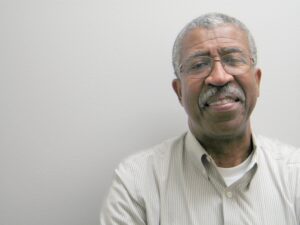
George Dicks
George Dicks, MHP, Lead for Harborview Mental Health Services Geriatric Psychiatry Service
What does your Black/African American heritage mean to you?
Black heritage is an opportunity to recognize the myriad achievements of the decedents of the survivors of the Trans-Atlantic Slave trade and to educate ALL Americans about their history, as it pertains to the social justice achievements of the decedents of the Trans-Atlantic Slave trade and the benefits derived by those efforts, whether they benefitted the diaspora or not. It is an opportunity to honor my ancestors in a conscious and public manner.
What are your favorite parts of Black culture or favorite Black cultural traditions?
Among my favorite elements of Black History Month, the things I become more focused on include the profound intellectual, musical and literary contributions to my psychological well-being and strength. The contributions of James Baldwin; the not-’I-Have-a-Dream’ speeches by our dear brother Martin and his commentary on American culture and our fealty to the tenants of the American Constitution; Frederick Douglass, the “father’’ of us all (intellectually); Harriet Tubman, Sojourner Truth. Remember how strong and functional WE are to have found JOY, even ecstasy in living and triumph over situational oppression/depression — to marvel at our survival, and to acquaint young brothers/sisters with their cultural inheritance.
Is there something you wish people knew more about your culture or racial identity?
More about the real lives of Black Americans and how they intersect with “dominant” culture. For example: Black Cowboys, Buffalo Soldiers, the founding settlers of Washington state, the history of Rosalyn and Spokane Valley, and Jackson Street in Seattle. Also, knowing more about Black inventors who created the traffic light, the shoe lasting machine, blood transfusion, the gas mask, the super soaker, our current plastic garbage can system, etc.
What can we do to honor Black people and Black cultures at UW Medicine?
Make a concrete program to recruit talented African American students into the healthcare profession — at the doctoral level — beginning in elementary school. Make good outcomes for African American and BIPOC patients more visible in BIPOC communities by addressing the concerns of the BIPOC community as they experience implicit bias; create mandatory training for physicians regarding implicit bias; train in approaches that encourage client/patient participation and understanding their own conditions and care; assess and develop digital competency; and address misconceptions regarding medical conditions prevalent in the African American community to improve health literacy.
Editor’s note: Responses were lightly edited for length, clarity and style.



